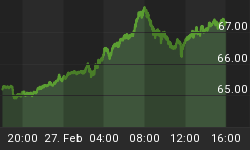The authorities in Europe are currently manning the fire hoses and pumping like mad. Whether their efforts douse the fire, or even hit the target, is a question yet to be answered. What is sure is that whatever is left will be thoroughly soaked. Fire or not, a flood is assured.
Today the Bank of England announced an increase in its purchases of covered bonds (a.k.a. quantitative easing) of £75bln (about $115bln). The ECB said it would buy €40bln (~$53bln) in covered bonds as well, and also provide unlimited loans of around 1 year in maturity to banks.
Again, the efficacy of these measures in forestalling the European banking crisis may be in doubt, but there is no doubt (or should be none) about the inflationary potential of pouring more money into the financial system. Commodities markets responded today - commodities often trade with the highest 'beta' to changes in near-term inflation expectations - with the DJUBS index rising 1.7% led by energy, industrial metals, and precious metals. Inflation swaps rose about 8bps as well. The 10y Treasury yield is back to almost 2% (1.99%). Surely, part of the equity rally today (the S&P popped another 1.8%) was due to the widespread belief that inflation pushes stock prices higher.
It might be fair to observe that by providing these funds now, instead of after Greece defaults, policymakers are for a change trying to build a fence at the top of the cliff instead of sending an ambulance to the bottom. There is the question of whether it's the right cliff, but to whatever extent these measures help - and I am somewhat skeptical on this point - there are to be commended for implementing them before the fact. After all, nearly all Euro area banks keep passing stress tests, so they clearly don't need this help yet, right? Uh, well, maybe.
Beware of thinking of the BOE/ECB policy as having only European effects. Approximately 2/3 of domestic US inflation (according to a 2005 paper by Ciccarelli and Mojon at the ECB) is sourced from global factors, such as profligate monetary policy pursued by other central banks. Liquidity is fungible, after all. US M2 has recently been rising, and there is some evidence that this may be resulting from a movement of bank balances from shaky Euro-area banks to US dollar-based banks. It is naïve to think this is unrelated to the provision of exceptional liquidity we are seeing now. Maybe that causality looks backwards - it was partly the exodus of balances that caused funding pressures which then precipitated further QE, rather than QE causing (directly) a rise in US M2 - but they are causally connected in any case.
Our strategies continue to be overweight in commodities versus underweight in TIPS and equities.
Tomorrow brings the Employment Report (Consensus: 55k payrolls, 9.1% Unemployment Rate). I think investors seem to be expecting a pretty decent number, after the ADP report earlier this week remained around 90k, making last month's unchanged Payrolls report look like the outlier. A 75k or 100k print wouldn't be anything to write home about, but it would help validate expectations. If the stock market rallies on such a print, I will be looking to sell into it with the intention of holding a small short over the weekend. I wouldn't do that if stocks were trading down, but right now it feels like a lot of good news from Europe and elsewhere has been fully discounted.















